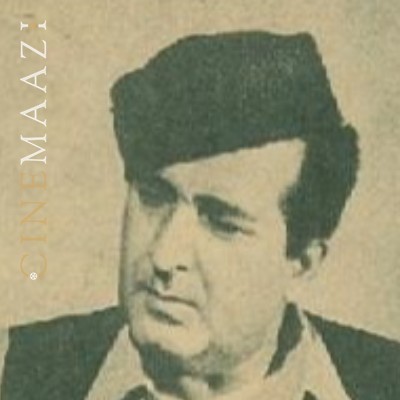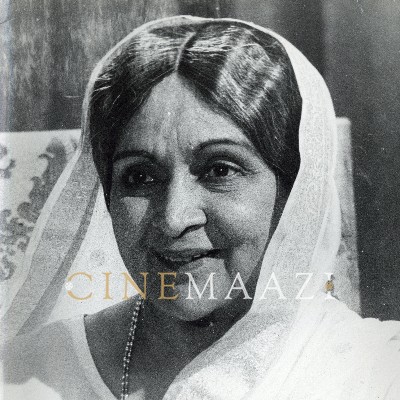Ram Khade
Subscribe to read full article
This section is for paid subscribers only. Our subscription is only $37/- for one full year.
You get unlimited access to all paid section and features on the website with this subscription.
Not ready for a full subscription?
You can access this article for $2 , and have it saved to your account for one year.
- Primary Cinema: Hindi
Film editor Ram Khade is known for films such as Rustom (The Champion) (1982), Bhakti Mein Shakti (1979) and Kesar Bhina (1978). He was mainly active in the 1960s and 1970s, in Hindi cinema, and worked often with actor-filmmaker Dara Singh.
Among the early films Ram Khade is credited with editing is Bedard Zamana Kya Jane (1959). Starring Ashok Kumar, Helen, and Nirupa Roy, the film, directed by Babubhai Mistry, told the tale of widower barrister Ashok who lives a wealthy lifestyle in Bombay along with his sister-in-law, and a young son, Ramesh. One day while driving, he accidentally runs over a woman, brings her home, cares for her until she recuperates and tells him that her name is Kamla and is homeless. He finds that Ramesh likes her, so he marries her. After a few months, he is delighted when she becomes pregnant. However, his happiness vanishes when he finds out, through his friend, Pran, that Kamla had been frequenting the OK Club. Then he witnesses her abusing Ramesh. Finally, he drives her out when Ramesh is killed by poisoned milk. Kamla gives birth to a baby boy but Ashok takes over sole custody and names him Mohan. Years later Mohan has grown up and is now an advocate and is in love with a girl named Radha. Even though Radha comes from a poor background, Ashok has no objections and goes to meet with her parents to arrange their marriage. There he discovers that Radha’s mother is none other Kamla. The film starred Ashok Kumar, Nirupa Roy, and Pran Sikand.
Along with Ambavane and Krishna Rao, he edited the S Bannerjee directorial Zindagi Aur Khwab (1961), which was written by Kamal Amrohi. It starred Rajendra Kumar Tuli, Meena Kumari, and Jayant. The story revolved around Shanti, an orphan whose stepmother tortures her and finally marries her off to Shankar, a criminal many years her senior. Shankar murders Chandabai, a mujrawali, and escapes. The police chase his truck, which falls into the river and he is presumed dead. Inspector Manoj visits Shanti in the course of investigation and they fall in love with each other. Shanti hopes for a better life, but Shankar appears alive and her hopes are dashed.
With Anant Khade, he served as the assistant editor of the Bhojpuri film Bidesiya (1963), directed by S N Tripathi, and written by Ram Murti Chaturvedi (dialogue and screenplay) and J L Sharma (story idea). It starred Kumari Naaz, Sujit Kumar, and Jeevan Dhar. It was based on the play of same name written by Bhikhari Thakur.
Along with Krishna Rao, he edited the P L Santoshi directorial Holiday in Bombay (1963), written by Madhusudan Kalelkar (screenplay) and Mahendra Saral (dialogue). Starring Shashi Kapoor, Vijaya Choudhury, and Rajendra Nath Malhotra, it revolved around cousins and avowed bachelors, Nath and Gautam, who plan a trip to Bombay with the sole motto of entertainment, fun and frolic. However, matters change when they actually lose their hearts and have to resort to maintain an elaborate façade.
In 1965, he edited Gopal – Krishna, directed by D Raman and written by Suresh Tripathi (screenplay and dialogue). Starring Prakash, Jayshree Gadkar, and D K Sapru, the film chronicled the birth of Bhagwan Shri Kishan, his childhood, and confrontation with his maternal uncle - Raja Kans.
He edited Dhyanu Bhagat (1978), directed by Dara Singh Randhawa, and written by Rameshchandra Pandey (dialogue), and Dara Singh Randhawa and Bhag Singh. A historical adventure drama, it revolved around Dhyanu Bhagat who, abandoned at birth, performs miracles but faces challenges from Mughal Emperor Akbar. It starred Dara Singh Randhawa, Komilla Virk, and Satish Kaul.
In 1979, Khade edited Bhakti Mein Shakti, the historical adventure drama directed by Dara Singh Randhawa, and written by Dara Singh Randhawa and Bhag Singh. It told the epic saga of goddess Sherawali Mata's devotee, Dhyanu Bhagat, and his trials, tribulations, and triumphs. The film also featured the historic and memorable visit of Emperor Akbar, who travelled barefoot to pay homage to Sherawali Mata, and provide a golden ‘chatra’ (umbrella) for her temple, an example that is cited even today to promote Muslim and Hindu unity. The film starred Dara Singh Randhawa, Satish Kaul, and Bharat Bhushan.
Along with Vithoba Surve, he edited Shankar Parvati in 1979, which was directed by Chandrakant. This devotional starred Rajni Bala, Kamini Bhatia, and Urmila Bhatt.
In 1982, he edited the drama film Rustom, alternatively titled The Champion. Produced by Dara Singh’s Dara Productions, its cast comprised Dara Singh, Tanuja, Sohrab Modi, Master Bittoo, Binny Rai, Rajendra Kumar, among others. Written and directed by Dara Singh, it also featured him as the washed up wrestling champ with a drinking and gambling problem trying to raise his son Sunny. Complications arise when Sunny discovers that his mother is still alive, after having been led to believe that she had died many years ago. The film had music by Anandji Veerji Shah.
1983 saw him editing the Punjabi language action crime comedy Unkhilli Muttiar, directed by Dara Singh Randhawa. It starred Dara Singh Randhawa, Shashi Puri, and Ratan Aulakh. The film told the story of Jeeto, who lives a poor lifestyle in Hasalpur along with her widower father, Baba Bachnia. When wealthy Ratan Chaudhary falls in love with her, she introduces him to her father, who approves of him, and arranges their marriage. Shortly before the marriage, however, Baggad Chaudhary visits them, and gives them the devastating news that Ratan is already married to a woman named Julie Cochinwala.
References
https://www.cinestaan.com/people/ram-khade-3956
https://indiancine.ma/WZW/info
https://www.imdb.com/title/tt0212812/fullcredits/?ref_=tt_cl_sm
https://www.imdb.com/title/tt0212915/?ref_=nm_knf_t_3
https://www.imdb.com/title/tt0213300/plotsummary?ref_=tt_ov_pl









.jpg)



